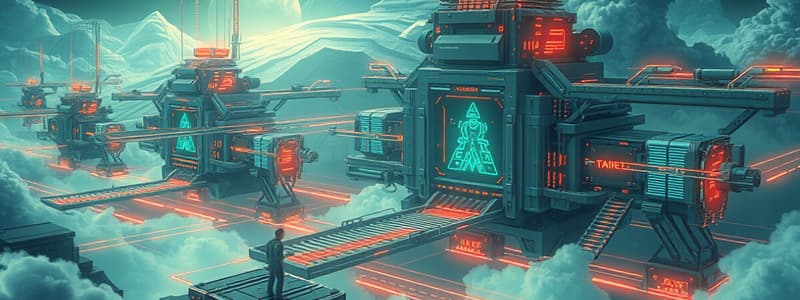Podcast
Questions and Answers
What does a state machine model?
What does a state machine model?
Systems using states and actions.
Which two types of state machines are mentioned?
Which two types of state machines are mentioned?
- Mealy machine (correct)
- Petri net
- Turing machine
- Moore machine (correct)
All computer systems are state machines.
All computer systems are state machines.
True (A)
A state machine captures the idea that a system progresses through a set of ______ by performing or responding to a set of actions.
A state machine captures the idea that a system progresses through a set of ______ by performing or responding to a set of actions.
What does the primary challenge in using state machines involve?
What does the primary challenge in using state machines involve?
What is a snapshot of a system in the context of state machines?
What is a snapshot of a system in the context of state machines?
State machines can only have a finite number of states.
State machines can only have a finite number of states.
Name an example of a simple state machine.
Name an example of a simple state machine.
In a state machine, what must be defined?
In a state machine, what must be defined?
Flashcards are hidden until you start studying
Study Notes
State Machines Overview
- State machines model systems by representing states and transitions between them.
- Essential components include states, actions, initial states, and state transitions based on actions.
- State machines simplify the abstraction of complex systems, making them easier to reason about.
Importance of State Machines
- All computer systems operate as state machines, involving states of registers and memory.
- Transitions between states reflect the program's operations leading from initial to final states.
- A programming language defines permissible operations, shaping the state machine.
Applications of State Machines
- Useful when abstracting irrelevant details reduces complexity to a manageable number of states.
- Employed in model checking to explore every possibility in system behavior.
- An essential tool for designing communication protocols and managing complex distributed algorithms.
Modeling Foundations
- State machines form the basis for advanced modeling techniques like Z, CSP, and Temporal Logic.
- There's no universal notation for state machines, with concepts broadly agreed upon but varying rigor based on specific scenarios.
Components of a State Machine
- States: Snapshot of system conditions, including variable values and execution locations.
- Actions: Events that trigger transitions between states.
- A complete definition specifies the possible states, initial states, actions, and transition behaviors.
Simple State Machine Examples
- A very basic state machine can consist of a single state, such as {stop}, with no actions associated.
- More dynamic examples can include states like {alarm} with actions such as {beep}.
Advanced State Machine Characteristics
- A more complex state machine may include multiple states like {off, idle, moving, crashed} with various actions.
- Non-determinism arises when a single action can lead to multiple outcomes or transitions from the same state.
- Machines can exhibit potentially infinite steps due to non-deterministic transitions.
Formal Definition
- A state machine is formally defined as a 4-tuple (S, A, I, T) where:
- S represents the set of possible states.
- A is the set of actions that can induce state transitions.
- I denotes the set of initial states from which the machine can begin.
- T defines the transition relation indicating how states change in response to actions.
Studying That Suits You
Use AI to generate personalized quizzes and flashcards to suit your learning preferences.




